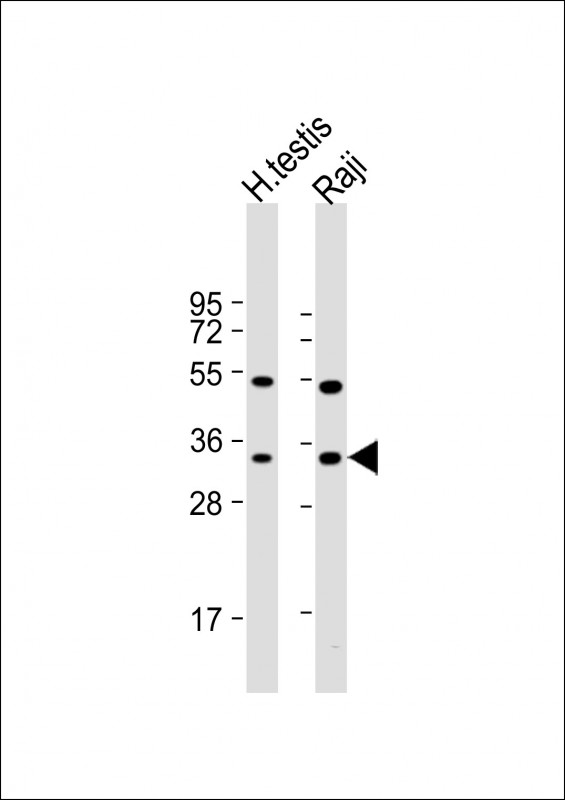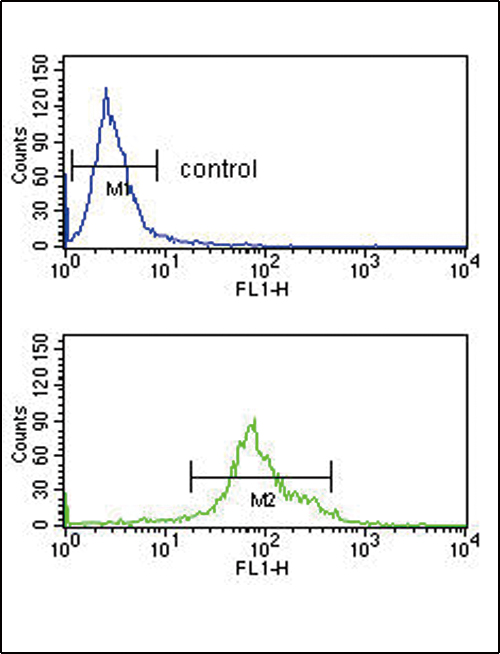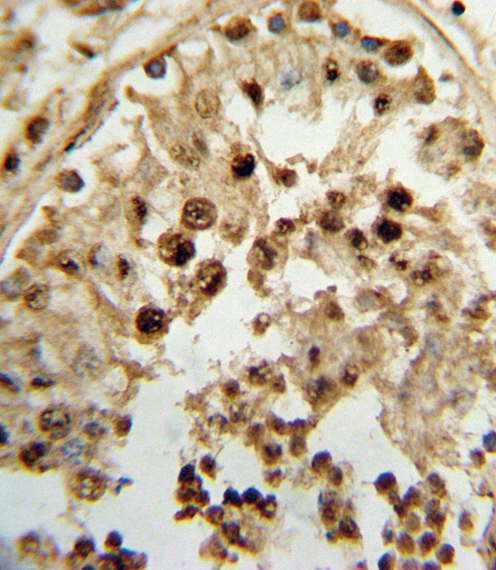


| WB | 1/1000 | Human,Mouse,Rat |
| IF | 咨询技术 | Human,Mouse,Rat |
| IHC | 1/100-1/500 | Human,Mouse,Rat |
| ICC | 技术咨询 | Human,Mouse,Rat |
| FCM | 1/10-1/50 | Human,Mouse,Rat |
| Elisa | 咨询技术 | Human,Mouse,Rat |
| Aliases | Testosterone 17-beta-dehydrogenase 3, 17-beta-hydroxysteroid dehydrogenase type 3, 17-beta-HSD 3, Testicular 17-beta-hydroxysteroid dehydrogenase, HSD17B3, EDH17B3 |
| Entrez GeneID | 3293 |
| WB Predicted band size | 34.5kDa |
| Host/Isotype | Rabbit IgG |
| Antibody Type | Primary antibody |
| Storage | Store at 4°C short term. Aliquot and store at -20°C long term. Avoid freeze/thaw cycles. |
| Species Reactivity | Human |
| Immunogen | This HSD17B3 antibody is generated from rabbits immunized with a KLH conjugated synthetic peptide between 89-118 amino acids from the Central region of human HSD17B3. |
| Formulation | Purified antibody in PBS with 0.05% sodium azide. |
+ +
以下是关于HSD17B3抗体的3篇参考文献的简要信息:
---
1. **文献名称**: *"Immunolocalization of 17β-hydroxysteroid dehydrogenase type 3 in human testicular tissues and its diagnostic utility in 17β-HSD3 deficiency"*
**作者**: R. Wilson et al.
**摘要**: 该研究利用特异性HSD17B3抗体,通过免疫组化技术定位HSD17B3蛋白在人类睾丸Leydig细胞中的表达,并探讨其在诊断17β-HSD3缺陷症中的应用。抗体验证显示其对HSD17B3具有高特异性,可区分患者与健康人群的组织样本。
---
2. **文献名称**: *"Development and characterization of a monoclonal antibody against human 17β-HSD3 for functional studies"*
**作者**: L. Zhang et al.
**摘要**: 文章描述了一种新型小鼠源单克隆抗体的开发过程,该抗体靶向人类HSD17B3蛋白。通过Western blot和免疫荧光验证其特异性,并用于研究HSD17B3在雄激素合成途径中的酶活性调控机制。
---
3. **文献名称**: *"Role of HSD17B3 in polycystic ovary syndrome: Insights from antibody-based protein expression analysis"*
**作者**: M. Tanaka & S. Patel
**摘要**: 研究采用HSD17B3抗体分析多囊卵巢综合征(PCOS)患者卵巢组织中该酶的表达水平,发现其表达下调可能与局部雄激素代谢异常相关,提示HSD17B3抗体在病理机制研究中的潜在价值。
---
**备注**:若需获取具体文献全文或更多信息,建议通过PubMed或Web of Science等数据库检索标题或作者。部分研究可能涉及抗体在疾病模型、诊断或分子机制中的具体应用。
The HSD17B3 antibody targets 17β-hydroxysteroid dehydrogenase type 3 (HSD17B3), a key enzyme in the biosynthesis of testosterone from androstenedione. Expressed primarily in the testes, HSD17B3 catalyzes the reduction of androstenedione to testosterone, a critical step in male sexual development and function. Mutations in the HSD17B3 gene are linked to 17β-HSD3 deficiency, a rare autosomal recessive disorder characterized by undervirilization in 46.XY individuals due to impaired testosterone synthesis.
HSD17B3 antibodies are essential tools for studying enzyme expression, localization, and function in reproductive biology and endocrine disorders. They are widely used in techniques like Western blotting, immunohistochemistry (IHC), and immunofluorescence (IF) to investigate HSD17B3's role in conditions such as disorders of sex development (DSD), infertility, and hormone-dependent cancers. Research also explores HSD17B3's potential involvement in prostate and breast cancer progression, as altered steroidogenesis may influence tumor growth.
Commercially available HSD17B3 antibodies are typically validated for specificity against human, mouse, or rat isoforms. Their applications extend to diagnostic assays for confirming 17β-HSD3 deficiency and preclinical studies targeting androgen-related pathways. Understanding HSD17B3 regulation remains critical for developing therapies for hormonal disorders and malignancies linked to steroid hormone imbalances.
×